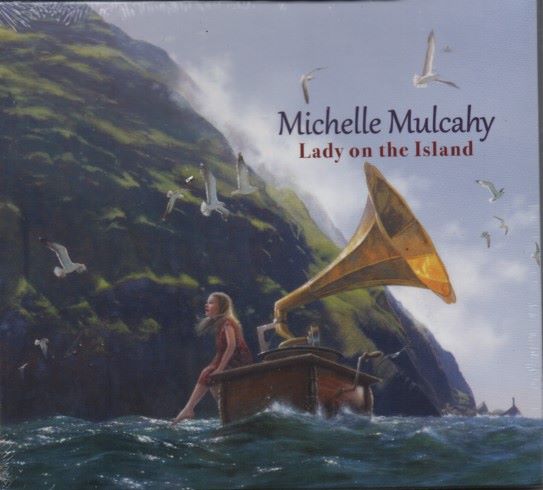Michelle Mulcahy: Lady on the Island
Michelle Mulcahy is one of Ireland’s most talented and gifted multi-instrumentalists in Irish traditional music today. She is considered to be one of Ireland’s most adroit and creative harpers. She is a regular performer and tutor worldwide, touring extensively in Europe, United States, Canada, China, Australia and Vietnam. Michelle has three highly acclaimed albums recorded with her father, Mick and her sister, Louise. She was awarded the prestigious TG4 Young Musician of the Year in 2006. Michelle has also recorded with Bill Whelan and the Irish Chamber Orchestra as lead soloist on his highly acclaimed Connemara suite album. Michelle’s solo harp debut album “Suaimhneas” has been receiving worldwide acclaim as one of the top harp albums in Irish Traditional Music, her second solo release ‘Lady on the Island’ is eagerly anticipated.
She could have chosen any one of a number of instruments for her latest album: fiddle, concertina, accordion, but Michelle Mulcahy’s solo harp album needs nothing by way of embellishment. Her playing is technically impeccable, her phrasing a masterclass in how to inhabit a tune, respecting its lineage while still putting her own insightful stamp on it.
Like most long players, Lady on the Island – the title borrowed from the album’s closing tune, which Mulcahy associates with the playing of the late east Galway accordion player, Joe Cooley – invites the listener to return again and again to discern the countless gemstones scattered throughout a beautifully curated tune collection.
Liner notes generously reference where tunes were first discovered, with particular attention to historical detail. Mulcahy’s reading of Tabhair dom do lámh finds previously undiscovered “sweet notes” that are a reminder of its origins, composed by the 17th century harper Ruairí Dall Ó Catháin.
Mulcahy comes into her own on another slow air, one of two original compositions on the album. Caoineadh Mick Moloney is an open-armed posthumous tribute to a musician who died unexpectedly last summer and whose influence is stitched through the harper’s music, while The Sweet Note, a tune composed to honour her father, Mick, is another highlight: dexterous, thoughtful, guaranteed to become a staple of the tradition.
Audio
Track 1: Scattery Island
Track 2: Tabhair Dom Do Lámh (Give Me Your Hand).
Track 3: The Drunken Sailor
Track 4: The Lady on the Island
Track Listing
- Jigs: Scatter The Mud / An Buachallín Bán / The Sweet Note
- Reels: Sligo Reel / The Mountain Lark / Sweeney’s Dream
- Hornpipe: The Drunken Sailor
- Air: Eochaill
- Waltz: Matthew’s Waltz
- March/Jig: Máirseáil Alasdruim / Maguire’s Kick
- Reels: Miss McGuinness / Rooney’s / The Green Gown Lass
- Air: Caoineadh Na dTrí Muire
- Jigs: Scattery Island /The Flowers Of Spring / Patty O’Leary’s
- Waltz: Tabhair Dom Do Lámh
- Jigs: The Clogher Rose /A View From Mount Eagle / Up Leitrim
- Air: Caoineadh Mick Moloney
- Reels: Tomeen O’Dea’s / Green Fields Of Rossbeigh / Lady On The Island
Also available from Copperplate:
The Mulcahy Family: Reelin' in Tradition
The Mulcahy Family: The Reel Note
Press Reviews
THE IRISH POST REVIEW Lady on the Island by Michelle Mulcahy
The harp, Ireland’s national symbol, can of course be found everywhere, on passports, on stout bottles and cans, on airline livery, and the oldest surviving Irish harp, the ‘Brian Boru’, is viewed daily in Trinity College by hundreds of tourists. It may then be surprising that the instrument isn’t more widely heard in Irish traditional music, but it seems that it virtually disappeared in the nineteenth century. Michelle Mulcahy’s new album, Lady on the Island, is sparkling example of the revival in harp playing that has gathered pace since the 1970s.
With her sister Louise and father Mick, Michelle has recorded four albums and the Mulcahys, who are from Abbeyfeale, Co. Limerick, received the 2023 TG4 Gradam Ceoil Music Group award. In the family trio Michelle plays an amazing range of instruments - accordion, concertina, harp, fiddle and piano. Harp is though Michelle’s primary instrument and Lady on the Island is her second solo harp album, a decade on from her debut, Suaimhneas.
If you are not familiar with Irish harp playing, you might imagine it might be rather formal and sedate but lend your ears to the opening set of three jigs and you’ll immediately discover just the opposite, something quite special. The delightfully titled Scatter The Mud was recorded by master fiddler player James Morrison in 1929, and here is lively but somehow at the same time unhurried, Michelle drawing out the melodic intricacies of the tune, with a understated switch up in pace to the second tune An Buachallín Bán, and the last, The Sweet Note, is a lovely tune Michelle composed for her dad to recognise his ongoing “musical and personal inspiration”.
The version Michelle plays of the hornpipe The Drunken Sailor will pick you and carry you away, and whilst she references its association with Dublin fiddler Tommy Potts, she makes it very much her own with a wonderful combination of subtly and nimble, danceable rhythm. Miss McGuinness, a reel recorded in 1927 by the great fiddler Michael Coleman with Paddy Finlay on piccolo, exemplifies how Michelle takes a tune that you’re more likely to hear on fiddle, flute or concertina, and breathes something different and uplifting into it. Tabhair Dom Do Lámh is a waltz doubtless familiar to many from its coupling with Raggle Taggle Gypsy on the opening track on Planxty’s debut 1972 album; Michelle playing of it is enchanting and she gives a detailed account of its composition in 1603 by the harper Ruairí Dall Ó Catháin.
The enthralling assortment of jigs, reels, waltzes, airs, a hornpipe and a march on Lady on the Island, are from a wide variety of sources – ranging from 1920’s recordings of legendary players, to famous names from the later part of the last century, to a couple of Michelle’s own compositions - all meticulously described by her in the CD booklet. We are used to hearing older traditional tunes composed by harpers played on other instruments so there is something particularly refreshing about an album of solo harp, especially when it’s played as well as it is here with Michelle’s highly accomplished, inventive and beautifully melodic playing. Dave McNally
Irish Music Magazine
Whenever I come across acclaimed musician Dr Michelle Mulcahy, it’s the astonishing beauty of her music that first comes to mind. I don’t often dwell on the PhD level of scholarship intrinsic to her name. But with this solo harp-album, I’m reminded of the multi-layered elements at play in Michelle’s artistic depth, complexity, giftedness, scholarship & vision. But better yet - she carries all that with grace, joy & a lightness of touch - evident from the very first notes - Michelle’s harp-music. Scatters the Mud in great style with poise, power, and a deliciously creative pause, before taking us on a dance-inducing delve across a gorgeous set of tunes including her composition The Sweet Note in tribute to her father. A beginning that magically holds both the subtle powerfulness of her musical assurance & a fragility of sound as real, featherlight & beautiful as birdsong.
Her notes fill the heart like liquid gold. In Tabhair Dom Do Lámh, Michelle’s ingenious & intuitive arrangement casts fresh light - harp-playing that imbues so much new beauty into this much-loved air from 1603. In great liner-notes, Michelle links Eochaill with gratitude for her connection to, and love of, the singing of An Rinn’s Nioclás Toibín. Her stunning interpretation of The Drunken Sailor is intoxicating in the best sense of that, a tribute to the hauntingly evocative fiddle-music of thelate Tommy Potts. No surprise from a young woman whose MA explored Emotional Meaning in Irish Music & a pioneering PhD exploring Burmese & Irish Harp traditions.
Connections, complexity and courage - Michelle’s commitment to tradition & mastery of many instruments paradoxically liberates this great artist to truly inhabit & re-imagine the tunes, a lingering explorative musical mindfulness that’s also lit with bright radical energy, elevating this album & gifting us with gorgeous music, longstanding engagement, true integrity.
Nowhere more evident than in Michelle’s utterly compelling composition Caoineadh Mick Moloney in the wake of the profound loss of her great friend and mentor. I came across these lines to Michelle from brilliant musician Maurice Lennon: “I can feel your love for Mick in every single note Michelle, he would be so proud. Truly beautiful.” And the same Mick would so approve of how Michelle carries us then to a joyful blast of reels. An important & impeccably lyrical CD. Deirdre Cronin
The Irish Times
Michelle Mulcahy is one of Ireland’s most talented and gifted multi-instrumentalists in Irish traditional music today. She is considered to be one of Ireland’s most adroit and creative harpers. She is a regular performer and tutor worldwide, touring extensively in Europe, United States, Canada, China, Australia and Vietnam. Michelle has three highly acclaimed albums recorded with her father, Mick and her sister, Louise. She was awarded the prestigious TG4 Young Musician of the Year in 2006. Michelle has also recorded with Bill Whelan and the Irish Chamber Orchestra as lead soloist on his highly acclaimed Connemara suite album. Michelle’s solo harp debut album “Suaimhneas” has been receiving worldwide acclaim as one of the top harp albums in Irish Traditional Music, her second solo release ‘Lady on the Island’ is eagerly anticipated. Siobhan Long
HEAD TOPICS
Her playing is technically impeccable, her phrasing a masterclass in how to inhabit a tune Like most long players, Lady on the Island – the title borrowed from the album’s closing tune, which Mulcahy associates with the playing of the late east Galway accordion player, Joe Cooley – invites the listener to return again and again to...
Like most long players, Lady on the Island – the title borrowed from the album’s closing tune, which Mulcahy associates with the playing of the late east Galway accordion player, Joe Cooley – invites the listener to return again and again to discern the countless gemstones scattered throughout a beautifully curated tune collection.
Liner notes generously reference where tunes were first discovered, with particular attention to historical detail. Mulcahy’s reading of Tabhair dom do lámh finds previously undiscovered “sweet notes” that are a reminder of its origins, composed by the 17th century harper Ruairí Dall Ó Catháin.
Mulcahy comes into her own on another slow air, one of two original compositions on the album.

